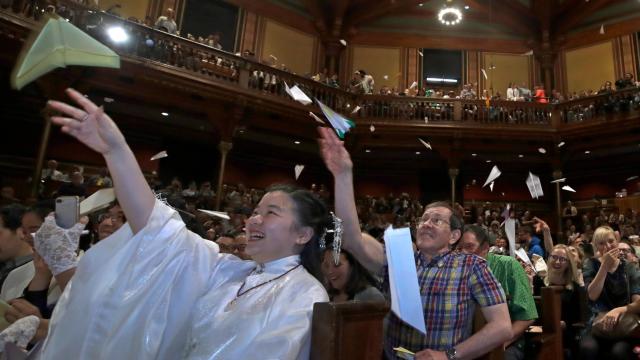The winners of the 2019 Ig Nobel Prize — an annual contest that satirises ridiculous science — have been announced.
This is the 29th running of the contest, which pokes fun at the quirkiest, weirdest, and least necessary scientific research. The competition, such that it is, is organised by the Annals of Improbable Research, a science-based humour magazine.
As is the case each year, a raucous awards ceremony was held at Harvard’s Sanders Theatre in Cambridge, Massachusetts. Here are the “winners” of this year’s contest, as announced by the Annals of Improbable Research in a press release.
French scientists Roger Mieusset and Bourras Bengoudifa won the anatomy award for “measuring scrotal temperature asymmetry” in mailmen, when either naked or fully clothed. Apparently the left testicle is warmer, but only when postmen wear clothes. Thank you, science.
Silvano Gallus from Italy gathered evidence that pizza is not the junk food it’s made out to be, and that it might actually confer health benefits, the caveat being that the pizza must be made and consumed in Italy.
Patricia Yang and David Hu, along with their colleagues, won the physics award for figuring out how wombats produce their odd, cube-shaped poop.
We’re not sure if this is a good or bad thing, but this is the second Ig Nobel awarded to Yang and Hu; back in 2015, the researchers won the award for revealing the so-called “Law of Urination,” whereby all mammals require around 21 seconds to empty their bladders (with a rather generous standard deviation of, ahem, 13 seconds).
Japan’s Shigeru Watanabe won the chemistry prize for figuring out how much saliva is produced by typical 5-year-old child each day. Joining Watanabe for the awards ceremony were his adult sons, who regrettably participated in the study 35 years ago.
The 2019 Ig Nobel prize for psychology was awarded to Germany’s Fritz Strack for his 1988 research showing that a pen, when held in a person’s mouth, forces them to smile, which subsequently makes them happier — and for his 2017 follow-up in which he overturned his own work. Self-debunking is apparently now a thing, but hey, that’s science.
A bizarre and terrifying dishwasher-like machine that can change a baby’s diaper won Iran’s Iman Farahbakhsh top prize in the engineering category.
Americans Karen Pryor and Theresa McKeon won the medical education award by showing that a popular technique, in which clickers are used to train animals (called operant learning), can also be used to train orthopaedic surgeons.
Shockingly, dead magnetised cockroaches behave differently than living magnetised cockroaches, a bit of seemingly useless insight that earned Ling-Jun Kong and his colleagues the top Ig Nobel prize in biology. Apparently dead cockroaches make for excellent magnets, which, ok.
The father-and-son team of Timothy and Andreas Vos, along with colleague Habip Gedik, won the award in economics for testing which country’s paper currency is better at collecting and transmitting dangerous bacteria. And finally, the Ig Nobel peace prize went to Ghada A. bin Saif and colleagues for measuring the psychological satisfaction of scratching an itch.
Our sincerest congratulations — and sympathy — for all the winners. And a quick note to the Annals of Improbable Research: Please never stop. These awards are like, the best thing ever.
